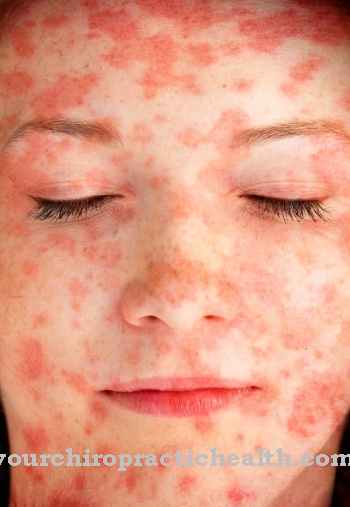At a hiccup or Hiccup there is a spasmodic contraction of the diaphragm, which suddenly closes the glottis as it progresses. The typical hiccup noises are caused by the blocking of the incoming air. Only chronic, i.e. constantly recurring hiccups require a medical examination. Occasional hiccups are harmless and usually go away quickly on their own.
What is hiccups?

Who doesn't know that sudden hiccup, commonly referred to as hiccups. The definition of a hiccup is that it is a sudden and reflex-induced contraction of the diaphragm. The sudden contraction causes the inhalation to be interrupted suddenly and for seconds. The vocal fold closure responsible for this is the actual cause of the noise that is subsequently heard.
Not only can humans have hiccups, but animals too. A hiccup even has a task, namely to shake the lungs before fluids penetrate by rapidly contracting the respiratory muscles. This is especially true in embryos and babies in which the larynx is not yet fully developed.
causes
Hiccups can arise for a number of reasons. On the one hand, it serves as a protective mechanism for the lungs - as described above - but also as a gag reflex. Hiccups can be triggered by food particles or foreign bodies in the esophagus. Eating and drinking hastily, cold drinks, or too much carbon dioxide in a drink can also trigger hiccups.
Under certain circumstances, the hiccups can also be associated with a disorder in the central nervous system. After a traumatic brain injury, cerebral haemorrhage and subarachnoid haemorrhage, certain brain tumors or encephalitis, hiccups may be the first symptom.
Disorders or injuries in the course of the phrenic nerve or the diaphragm can also trigger hiccups.
If hiccups persist for hours or days and do not go away on their own or with certain auxiliary techniques, you should consult a doctor.
The same applies if there are other symptoms besides the hiccups that can be related. This would be the case, for example, if you have pain at the level of the diaphragm. Inflammation of the diaphragm or irritation of the pancreas can trigger hiccups as well as abscesses that have settled there, operations in the upper abdomen, scar tissue or a tumor in this region.
Chronic hiccups are relatively rare. It can last for several years and seriously affect the person affected. A patient became known who had chronic hiccups from 1922 to 1990. Interestingly, it almost exclusively affects men. Patients suffering from chronic hiccups can find help at the Ruprecht-Karls-Universität in Heidelberg.
You can find your medication here
➔ Medicines for lung and bronchial problemsDiseases with this symptom
- concussion
- abdominal influenza
- Brain tumor
- Inflammation of the diaphragm
- Encephalitis
- Inflammation of the pancreas
Complications
Hiccups can have many complications. First of all, the symptoms restrict the ability to take in food and fluids, which can lead to dehydration and deficiency symptoms. In addition, the risk of choking and inhaling food into the deeper lung areas increases, which can lead to aspiration pneumonia.
Swallowing gastric juice that has been choked up is a possible complication that irritates the airways and often leads to nausea and vomiting. Hiccups can also make it difficult to fall asleep, causing stress and fatigue. Chronic hiccups can also lead to sleep disorders and, in the further course, to depression.
In the long term, hiccups put a strain on the lining of the esophagus and increase the risk of heartburn, inflammation in the throat and tumors. If the symptoms occur in old age, this can, in interaction with the already impaired taste and smell, lead to a complete refusal to eat, with typical consequences such as weight loss and a reduction in general condition. Hiccups after an abdominal surgery can cause the wound to rupture again. Hiccups must therefore always be clarified with the family doctor in order to avoid complications.
When should you go to the doctor?
Hiccups can hit anyone, from toddlers to old people. The hiccup can be seen even in unborn children. In itself it has no disease value and therefore does not need to be treated. However, the situation may be different if someone has hiccups every day or experiences persistent cramping of the diaphragm with subsequent hiccups.
Since hiccups can become chronic, consult a doctor if the pain persists. If someone experiences unstoppable scuffing for two days, a visit to the doctor is indicated. However, idiopathic chronic hiccups are difficult to treat. However, in rare cases, hiccups can indicate serious illness. The singultus can indicate a reflux disorder, esophageal problems or a disease in the gastrointestinal tract. Occasionally it has been observed that hyperthyroidism, diabetes, inflammation of the liver or pancreas, and kidney disease can trigger hiccups. Also, hiccups can indicate a stroke or diaphragmatic tumor. Therefore, the causes must always be clarified.
Those affected should see a doctor if the hiccups occur frequently or are particularly severe. If the hiccups lasts for days or is accompanied by symptoms such as jaundice, heartburn, headache, dizziness, stomach ache or nausea, a visit to the doctor makes sense. In addition, hiccups can be accompanied by warning signs such as feelings of fatigue, a swollen throat, or weight loss. Such symptoms are an indicator for a visit to the doctor.
Doctors & therapists in your area
Treatment & Therapy
As a rule, hiccups do not need to be treated, as they will go away on their own after a short time (approx. 5 minutes to 30 minutes). In addition, the hiccups are usually not a health hazard, so treatment by a doctor will not bring about any significant improvement.
However, many people are also familiar with numerous tips and tricks that can be used to treat hiccups. The medical effectiveness is controversial, but often it still seems to help. You can hold your breath, kiss someone, drink a glass of water upside down, or just take several deep breaths.
The medical literature even describes therapies using pharmacological agents such as cannabis. The rectal finger massage should also help with hiccups. In addition to the nasal application of vinegar, stubborn hiccups are treated with neuroleptics or sedatives, previously also with diazepam. Otherwise, prokinetics, proton pump inhibitors or sympathomimetics are occasionally used. Treatment for hiccups must be tailored to the identified cause.
Outlook & forecast
Hiccups are not a serious medical symptom. In most cases, the hiccups do not have to be treated and will go away on their own. Often times, the hiccups occur primarily when swallowing occurs while swallowing or drinking a liquid. However, once the lungs have calmed down, the hiccups will go away on their own within a few minutes.
Hiccups are more common in babies and children and are not a medical problem that needs treatment. Children choke more often, which is why there are more frequent hiccups.
If the hiccups last a little longer, the chest can be soothed with a hot water bottle. It also often helps to drink some fluids and breathe calmly. Treatment by the doctor or surgery is not necessary. The hiccups do not lead to any further complications.
You can find your medication here
➔ Medicines for lung and bronchial problemsprevention
Home remedies ↵ for hiccups There is not too much that can be done to prevent the hiccups. However, one can get into the habit of not eating hastily, pouring cold drinks, or speaking with your mouth full. If you have hiccups, it should also be helpful not to drink while eating. Another piece of advice against hiccups is not to swallow while talking.
You can do that yourself
Various home remedies and tricks can help with acute hiccups. Measures such as frightening, holding your breath and swallowing three times or gargling with water have proven effective. A pressure point massage, in which the soft area behind the earlobe is gently massaged, relaxes the diaphragm and relieves the hiccups almost instantly.
To avoid hiccups in the first place, strongly carbonated liquids should not be drunk. People over 50 can reduce hiccups by chewing on cloves. Younger people are advised to eat slowly and chew each bite well. It should also be drunk slowly and with large sips. Strongly carbonated or alcoholic beverages as well as spicy, spicy and gasping foods should be avoided until the symptoms are relieved.
What helps with hiccups: Cold water and as much raw food as possible. Lemon juice, salt and vinegar are also said to have soothing properties. A doctor should be consulted in the event of chronic hiccups. In addition, the singultus can be alleviated through relaxation measures and light medication. Home remedies such as chamomile or sage tea or a massage also provide relief for chronic complaints and are a suitable addition to specialist treatment.



























